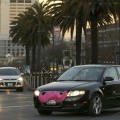 Uber has changed the way people get around. It also may change how people approach work.
Uber has changed the way people get around. It also may change how people approach work.
The app-based taxi service has shown that technology can make people’s work lives more flexible and dynamic. Uber drivers can work when they want and for how long.
It’s a business model being replicated in other fields, from shopping for groceries to seeking legal and medical advice. The practice even has a name: “Uberification.’’
Much like Uber did with taxis, companies are finding traditional jobs can be divided and assigned to people as needed, with wages determined by the supply and demand. Every worker’s performance is tracked and reviewed in real time by the very people who matter the most – customers.
Headquartered in San Francisco, Uber uses a smartphone application to receive ride requests, which are sent to drivers who work independently and own their own cars. Fares are determined based on the demand for rides at any given time and how many drivers are out on the road.
Other companies are quickly discovering the potential.
Instacart is a grocery delivery service in which customers hire personal shoppers to pick up and deliver items from local stores, including Whole Foods Market and Costco. Customers pay a delivery fee, which starts at $3.99 for orders over $35 delivered in two hours and $5.99 for similar orders delivered in an hour.
Personal shoppers deliver in various major cities nationwide, from New York to Atlanta to Los Angeles, and are continuing to expand.
Clients can request a variety of products and brands and even note the desired ripeness of fruit. Among the requirements for personal shoppers: just a car, a smartphone and a love for grocery shopping.
For people needing legal help, 2-year-old Upcounsel offers legal advice from a network of attorneys. Clients can receive proposals within hours of a posting and communicate privately with select attorney to decide which if the best attorney for you and your budget.
Similarly, HealthTap offers members around-the-clock access to doctors via video, voice or chat on any personal computer or mobile device for about $99 a month.
Much like Uber, these on demand-oriented companies give employees more flexibility on when and how much they work. They don’t need an office and they can work around their own schedules.
But it’s not without challenges. The rise of on-demand work could bring less predictable income, especially in weaker economic times. Independent contractors also don’t enjoy the benefits and security of traditional jobs.





